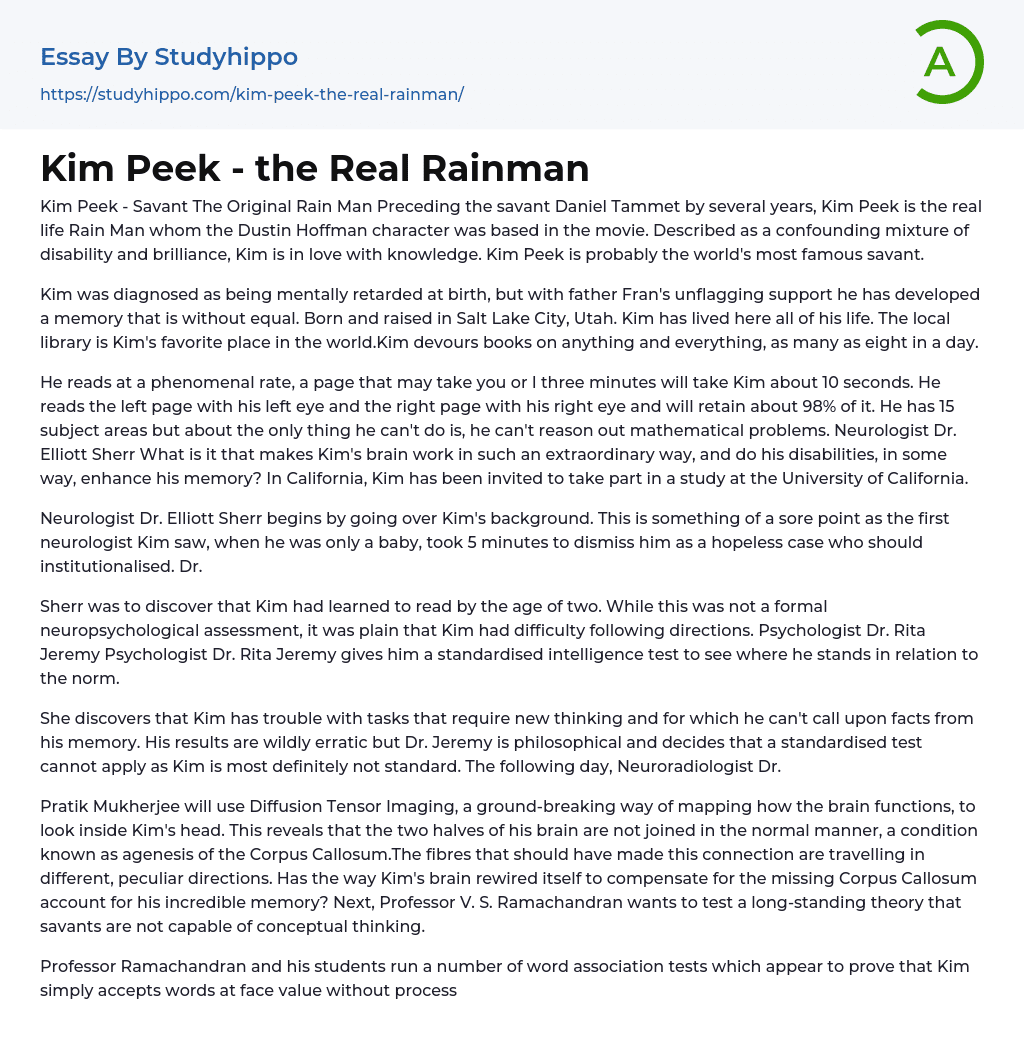Kim Peek - Savant The Original Rain Man Preceding the savant Daniel Tammet by several years, Kim Peek is the real life Rain Man whom the Dustin Hoffman character was based in the movie. Described as a confounding mixture of disability and brilliance, Kim is in love with knowledge. Kim Peek is probably the world's most famous savant.
Kim was diagnosed as being mentally retarded at birth, but with father Fran's unflagging support he has developed a memory that is without equal. Born and raised in Salt Lake City, Utah. Kim has lived here all of his life. The local library is Kim's favorite place in the world.Kim devours books on anything and everything, as many as eight in a day.
He reads at a phenomenal rate, a page that may take you or I three min
...utes will take Kim about 10 seconds. He reads the left page with his left eye and the right page with his right eye and will retain about 98% of it. He has 15 subject areas but about the only thing he can't do is, he can't reason out mathematical problems. Neurologist Dr. Elliott Sherr What is it that makes Kim's brain work in such an extraordinary way, and do his disabilities, in some way, enhance his memory? In California, Kim has been invited to take part in a study at the University of California.
Neurologist Dr. Elliott Sherr begins by going over Kim's background. This is something of a sore point as the first neurologist Kim saw, when he was only a baby, took 5 minutes to dismiss him as a hopeless case who should institutionalised. Dr.
Sherr wa
to discover that Kim had learned to read by the age of two. While this was not a formal neuropsychological assessment, it was plain that Kim had difficulty following directions. Psychologist Dr. Rita Jeremy Psychologist Dr. Rita Jeremy gives him a standardised intelligence test to see where he stands in relation to the norm.
She discovers that Kim has trouble with tasks that require new thinking and for which he can't call upon facts from his memory. His results are wildly erratic but Dr. Jeremy is philosophical and decides that a standardised test cannot apply as Kim is most definitely not standard. The following day, Neuroradiologist Dr.
Pratik Mukherjee will use Diffusion Tensor Imaging, a ground-breaking way of mapping how the brain functions, to look inside Kim's head. This reveals that the two halves of his brain are not joined in the normal manner, a condition known as agenesis of the Corpus Callosum.The fibres that should have made this connection are travelling in different, peculiar directions. Has the way Kim's brain rewired itself to compensate for the missing Corpus Callosum account for his incredible memory? Next, Professor V. S. Ramachandran wants to test a long-standing theory that savants are not capable of conceptual thinking.
Professor Ramachandran and his students run a number of word association tests which appear to prove that Kim simply accepts words at face value without processing them in any way.He takes metaphors literally. All of which seems to back up the theory. Kim Peek may be the greatest savant we have ever known, he is certainly the best known and more than entitled to be referred to as a mega-savant.
He can
recall thousands of zip codes, phone codes, dates and countless facts and figures. He has a truly awesome memory. Is he autistic? Probably, but like Daniel Tammett, not in the conventional sense. He was originally diagnosed with autism but this was later changed.
- Interpretation essays
- Plagiarism essays
- Analogy essays
- Learning English essays
- Abnormal Psychology essays
- Abraham Maslow essays
- Attachment Theory essays
- Authority essays
- Behaviorism essays
- Classical Conditioning essays
- Cognitive Psychology essays
- Counseling essays
- Developmental Psychology essays
- Educational Psychology essays
- Erik Erikson essays
- Family Therapy essays
- Jean Piaget essays
- Maslow's Hierarchy Of Needs essays
- Mental Health essays
- Operant Conditioning essays
- Personality Psychology essays
- Positive Psychology essays
- Psychoanalysis essays
- Psychotherapy essays
- Sigmund Freud essays
- Social Psychology essays
- Stanford Prison Experiment essays
- Supersize Me essays
- Coaching essays
- Critical Thinking essays
- homework essays
- Learning essays
- Library essays
- Listening essays
- Literacy essays
- Mentor essays
- Physical Education essays
- Project essays
- Reading essays
- Research essays
- Sex Education essays
- Social Studies essays
- Standardized Testing essays
- Study Plan essays
- Teaching essays
- Accident essays
- Awareness essays
- Benefits of Volunteering essays
- Challenges essays
- Childhood Memories essays




